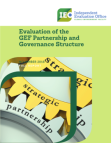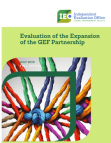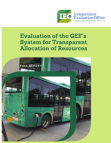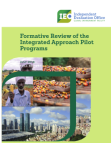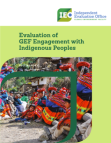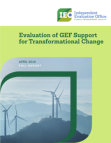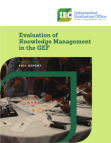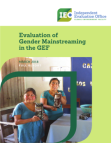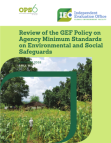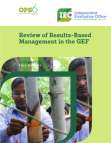This evaluation addressed three key components of the Sixth Comprehensive Evaluation of the Global Environment Facility (GEF) (OPS6): the comparative advantage of the GEF as a funding channel, the adequacy of donor funding/financing, and the current governance structure and health of the…
Comparative Advantage, Adequacy of Funding / Financing, Health of the Expanded GEF Partnership and Governance Structure 2017
Evaluation of the Expansion of the GEF Partnership 2016
During the GEF-5 replenishment negotiations it was agreed that, within the framework of paragraph 28 of the GEF Instrument, the GEF partnership needs to be broadened further to enhance country ownership in the GEF operation and to provide recipient countries greater choice in terms of agencies…
Evaluation of the GEF' System for Transparent Allocation of Resources (STAR) 2017
In September 2005, the GEF Council agreed to implement a resource allocation framework for the GEF 4 replenishment period. Implementation of the resource allocation framework started in 2006 and it covered biodiversity and climate change focal areas. During its implementation, several weaknesses…
Review of the Integrated Approach Pilot (IAP) Programs 2017
This evaluation is a review of the three Integrated Approach Pilots introduced in GEF-6. They were designed to implement integrated programming as a means of achieving systemic change at scale by addressing the major drivers of global environmental degradation in a holistic way. They are:
…Evaluation of GEF Engagement with Indigenous Peoples (IPs)
The GEF has been engaging with indigenous peoples since its inception and significant steps have been taken by the GEF to increase the engagement and participation of indigenous peoples in GEF activities over time. The purpose of this evaluation is to assess the GEF's engagement activities with…
Evaluation of GEF Support for Transformational Change
Supporting transformational change is a strategic priority of the Global Environment Facility (GEF), as cited in its 2020 vision statement. In this context, transformational change can be understood as deep, systemic, and sustainable change with large-scale impact in an area of global…
Evaluation of Knowledge Management (KM) in the GEF 2017
The relevance of knowledge management to the GEF mandate has been increasingly recognized over the past 15 years. However, the Third, Fourth, and Fifth Overall Performance Studies of the GEF reported that the approach to knowledge management during this period was not comprehensive and had…
Evaluation of Gender Mainstreaming in the GEF 2017
The GEF Policy on Gender Mainstreaming came into effect when it was adopted by the GEF Council members at 40th Council Meeting in May 2011. The policy was developed from principles and safeguards dating back to the 1996 Council document Public Involvement in GEF Projects (GEF/C.7/6), the key GEF…
Review of the GEF Policy on Agency Minimum Standards on Environmental and Social Safeguards
This review of the GEF Policy on Agency Minimum Standards on Environmental and Social Safeguards (2011) aims to provide insights and lessons for GEF7 replenishment cycle, focused on four key questions;
- To what extent have the GEF Safeguards added value to the GEF partnership? …
Review of Results-Based Management (RBM) in the GEF 2017
The approach paper for the Sixth Comprehensive Evaluation (OPS6) of the Global Environment Facility (GEF) specified results-based management (RBM) as one of the topics to be covered by the evaluation. This review of RBM has been undertaken within the framework of OPS6 and is an input to the…
